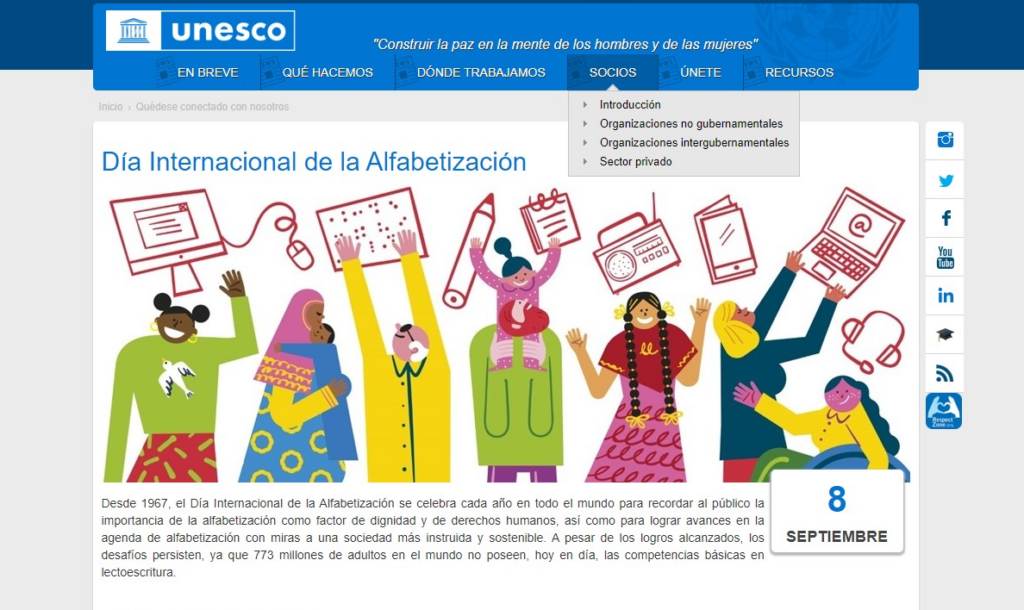Esta entrada también está disponible en: Aragonés Català Español Français English
VIRAL AND NOT SEEING ANYTHING
Can you imagine not being able to tweet? Or watching a TikTok or Youtube video and not understanding what you see? What a horror, isn’t it?
Just imagine: a friend of mine has just posted a video in which she appears dancing. It looks like one of many. She dances, well, that’s it, as she does in all of them. But it turns out that she has put some strange little symbols in the video.
Suddenly, something happens that has never happened before: all your friends start adding similar little drawings next to the video.
You know they think it’s really funny because they add laughing faces, but even so, you still don’t quite understand what’s going on. What’s so funny? Why don’t they stop adding lines and lines of these strange symbols?
Days go by and the lines and lines of cartoons go on and on and your friend’s video goes viral. The whole world is watching and laughing at those little symbols she superimposed on the screen when she posted the video.
You feel like they’ve set up a club and you haven’t been invited and it’s all happening without you being a part of it, but it’s your best friend’s video! You should be at the forefront of the story! However, the feeling you get is that you are completely on the sidelines.
You finally pluck up the courage to ask your friend what’s going on and she replies:
“It’s true, you don’t know how to read”.
She explains what it says and you finally understand everything: the joke is brutal, hilarious. It completely changed the video and you understand why it has gone viral, but you would have loved to have been part of it while it was happening.
Have you ever thought about how much of the world you would miss out on if you couldn’t read and write? Just by imagining it, I already feel totally displaced and left out of everything that happens every day, don’t you?
It is true that, in our environment, the percentage of illiterate people is small, but, even if they are few, are there still people in Aragon who cannot read? Reed on to find out.
Description
Since 1967, International Literacy Day has been celebrated all over the world to remember the importance of literacy as a factor of dignity and human rights. This awareness is intended as an impetus for advancing the literacy agenda to achieve a more literate and sustainable humanity.
A more literate society is a society that is more aware of its rights and therefore freer.
Despite the progress made, there is still a long way to go: nearly 800 million adults in the world still lack basic literacy skills.
For further information:
On UNESCO”s International Literacy Day website.

Among other information, documents and resources, the site contains details of UNESCO’s new strategy for youth and adult literacy (2020-2025).
The objectives and contents of this proposal can be related to another significant date also addressed in this project: the International Day of Education (24 January); this page also refers to the Aragonese Day of Education (30 May).
In Aragon
Illiteracy is very marginal here, but it still exists. During the 20th century, the generalisation of primary education meant that the basic notions of reading and writing could gradually reach almost all levels of society. But this has not been absolute: the conditions of social and economic inequality in different areas have meant that there are still Aragonese men and women who have never had access to literacy. The migration issue also poses urgent challenges. At the end of 2021, there were still 9,000 adults in Aragon who could neither read nor write.
In addition, there is also functional illiteracy: people who know how to read and write but never read or write.
The Workers’ Training Centre (Centro Obrero de Formación) (CODEF), within the Adunare Foundation, is an Adult Education Centre, and has been doing this initial teaching work for many years. Other volunteers from different non-governmental organisations carry out literacy campaigns which certainly deserve to be supported by public institutions.
A detail
Technology provides tools to support literacy. But, at the same time, this same technology makes us very dependent and sometimes imposes its rules: many technological advances, also based on the basic knowledge of reading and writing, have caused those who do not have them (especially the elderly population) to fall even further behind.
A news item on Aragon TV (October 24, 2021) focused on strategies to alleviate illiteracy, and placed particular emphasis on the digital divide.
It doesn’t matter whether the illiteracy is digital or manual, because as long as there are people who cannot communicate with the world around them, there is still a lot of work to be done.
Further information
International Literacy Day Spot 2022: Transforming learning spaces
Suggestions for teachers
Students can be encouraged to find out from their homes, from their elders, especially grandparents, what their education was like, up to what age they studied, if they had to start working very early, if they would have liked to continue studying. It may also be interesting for them to tell them, depending on the case, what readings they remember most fondly from their childhood, from their youth… Special attention should be paid to students who may be living in precarious family situations.
A sharing session can be organised on the basis of essays, Power Point presentations, etc.
Among the basic strategies for the application of the development of the curriculum of the Autonomous Community of Aragon is the development of communicative skills, through progress in oral expression and the promotion of reading and writing, in all subjects at the different levels of education.
Awareness of the importance of this commemoration helps to reinforce this strategy. As a social fact and indicative of problematic social realities and global inequality, illiteracy must be addressed from the aspects of cooperation and solidarity raised in the curriculum.
Objectives that this proposal helps to achieve
ESO:
- To assume their duties responsibly, to know and exercise their rights in respect for others, to practice tolerance, cooperation and solidarity among individuals and groups, to exercise dialogue, strengthening human rights and equal treatment and opportunities between women and men, as common values of a plural society, and to prepare for the exercise of democratic citizenship.
- To develop basic skills in the use of information sources in order to acquire new knowledge with a critical sense.
Baccalaureate:
- To exercise democratic citizenship, from a global perspective, and acquire a responsible civic conscience, inspired by the values of the Spanish Constitution, as well as by human rights, which fosters co-responsibility in the construction of a fair and equitable society.
- To consolidate personal and social maturity that allows them to act responsibly and autonomously and to develop their critical spirit. To foresee and resolve personal, family and social conflicts peacefully.
- To promote effective equality of rights and opportunities between men and women, to analyse and critically assess existing inequalities and discrimination, and in particular violence against women, and to promote real equality and non-discrimination of people for any personal or social condition or circumstance, with special attention to people with disabilities.
Subjects with which it can be linked
- Spanish Language and Literature (ESO, 1st and 2nd cycles)
- Education for citizenship and human rights (ESO, 2nd cycle)
- Baccalaureate: To be assigned according to modality
Development of competences
- Competence in linguistic communication.
- Social and civic competences.
- Cultural awareness and expressions.
